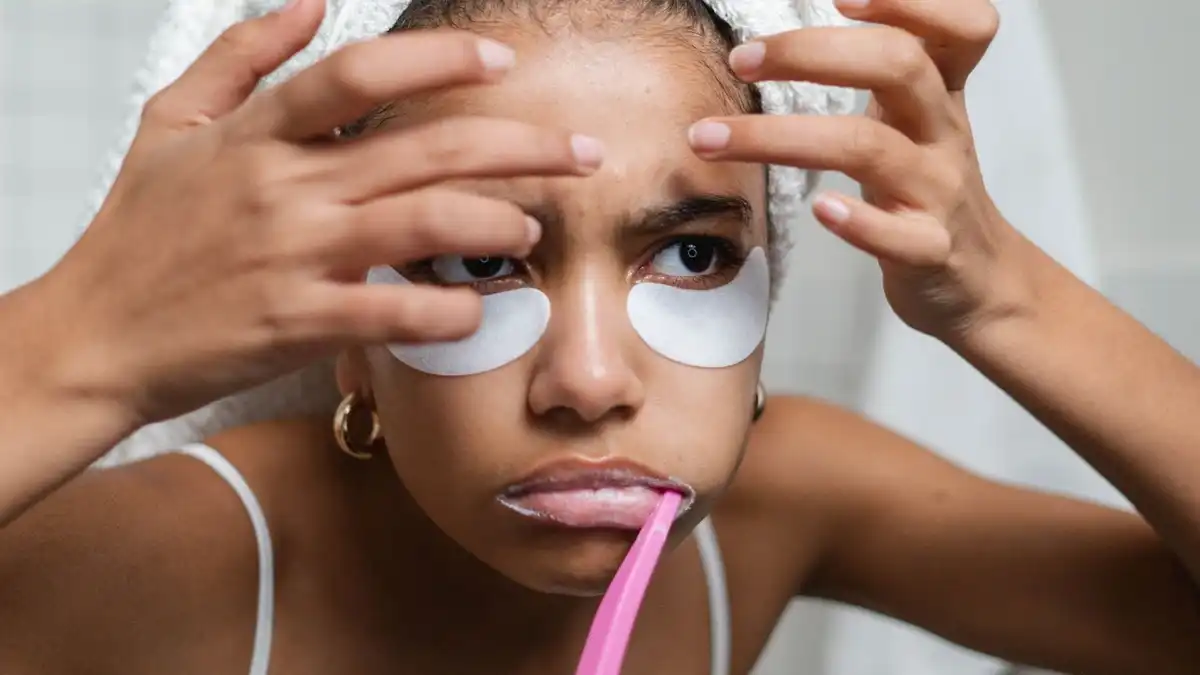Can Brushing Your Teeth Clear Up Your Acne?


Are you constantly struggling with acne, breakouts, pimples, blackheads, whiteheads, and oily skin? It’s time to take a step back and look at your routine. It turns out that oral care is the new skincare when it comes to a holistic approach to battling acne.

Oral Care Is The New Skincare
How on earth can taking care of your mouth, teeth, and gums make a difference in your skin? Well, your mouth is the gateway to your body. And when your mouth shows evidence of heavy amounts of bacteria, the rest of your body is definitely impacted.
When your dentist looks inside of your mouth, they can see symptoms of certain medical conditions that you might not otherwise be aware of. If you’re dehydrated, have active gum disease, or there are yeast infections, those can all tie back to how your skin looks and feels.
Link Between Oral Health And Skin
How can the health of your mouth lead to breakouts? Well, it turns out that if you have a gum infection—such as gingivitis or periodontitis—it causes your body to have an increase in propionibacterium. Say that five times fast. Well, propionibacterium is the bacteria that you usually see in facial pimples.
Theoretically, you could get propionibacterium on your face from your mouth if your gums are infected. Especially if you bite your nails, touch your face, or maybe if somebody plants a big sloppy kiss on your cheek.

So, Will Brushing More Help Clear Up My Acne?
The routine removal of dental plaque is definitely associated with an improvement in numerous diseases, illnesses, and yes, skin health.
Side note: The relationship between healthier gums and skin has nothing to do with the ingredients in your toothpaste. In other words, don’t use toothpaste as an acne spot treatment. It could irritate your skin because of the exfoliants or whitening ingredients.
Recreate Your Skincare Routine To Include Dental Care
If you’re struggling with both pimples/acne and gum problems, it’s definitely time to re-vamp your oral care and skincare routines. Even the order in which you complete these steps can make a difference in the health of your skin.
For instance, if you used to wash your face and then brush your teeth, you were probably getting oral bacteria across your chin and around your lips, which might not have been getting cleaned off very well afterward. Changing up the order of your self-care routine and performing each step properly can make a world of difference (for both your smile and your skin!)
The New Daily Skincare And Oral Routine
By simply adjusting your daily routine, your can improve both your dental and skin health!
- Brush
- Floss
- Rinse
- Cleanse
- Tone
- Moisturize
1. Brush
Brush before you wash your face. That way you’ll still be cleaning your face after any saliva, toothpaste, or bacteria that makes it onto your skin.
To target gum infections like gingivitis, you want to tilt your toothbrush toward your gumlines and make short, gentle strokes. Bleeding and tenderness are common if your gums are infected. Brush for two minutes at least twice a day. Morning and evening are best. If you can, invest in an electric toothbrush since it can help with even more thorough plaque removal.
If you wonder whether or not you’re cleaning your teeth well enough, you can always buy disclosing tablets to check to see if there’s any plaque left inside your mouth.
2. Floss, Focus On Technique
When and how you floss probably plays an even bigger role in gum disease than brushing does. So, if you really want to combat the oral bacteria that can cause acne, flossing needs to be an integral part of your daily routine. But relax, you only technically need to floss once per day.
To properly floss, slide a strand down between your teeth and then wrap it in a “C” shape against one of them. Hug the tooth tightly then rub the floss up and down several times, extending down under the edges of your gums. Just don’t push it too hard into your tissues. Then lift the floss up and over the pointed gum tissue and move to the neighboring tooth. Repeat this process around the sides of every tooth in your mouth.
Hate flossing? Get a water flosser instead!
3. Use Fluoride Rinse
After you brush and floss, rinse with a fluoridated mouthwash. Antimicrobial mouth rinses are ok too, but fluoride blends help combat tooth decay.
Make sure you don’t eat or drink anything for at least 30 minutes after using fluoride. If you prefer, you can save this part of your oral care routine for right before bed. Using an over-the-counter fluoride rinse is just fine. But if you have an especially high cavity risk it’s worth asking your dentist to prescribe a more concentrated gel.
4. Cleansing — Washing Your Face.
Use lukewarm water and a gentle, non-abrasive cleanser. Always use a clean, soft washcloth to prevent any new bacteria from coming into contact with your skin. Or if you prefer, you can also use your fingertips as long as your hands are freshly washed.
Make gentle, circular cleansing motions across your face, particularly targeting problem areas where you break out more frequently. Try not to aggravate your skin by scrubbing too hard or irritating any acne you already have.
Rinse your face with lukewarm water and then use a clean towel to pat your skin dry.
5. Toning — Balancing The Skin.
If you have especially oily skin or frequent breakouts, using a toner between your cleansing and moisturizing routine could help with clearer skin. Toner helps tighten pores, which can reduce your chances of dirt, oil, or germs contributing to the development of pimples.
6. Moisturizing — Hydrating And Softening The Skin
Moisturizer helps you control patchy, oily, or dry skin throughout the day. Since skin irregularities can contribute to acne, using the right moisturizer is an important step. Don’t skip it!
Link Between Oral Health And Systemic Health
- Diabetes
- Respiratory diseases
- Infertility, ED, and pre-eclampsia
- Heart disease
- Stroke
When To See A Dentist
If you’re prone to acne breakouts and pimples, take a peek inside of your mouth. Are your gums red, bleeding, or swollen? If they don’t improve with 10-14 days of dedicated brushing and flossing, you need to go ahead and schedule a professional dental cleaning and exam with your dentist. Your face (and body) will thank you!

Make your inbox smile!
Subscribe






